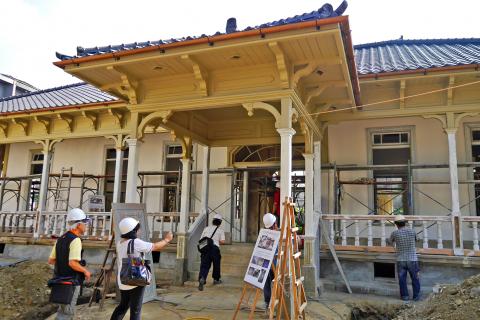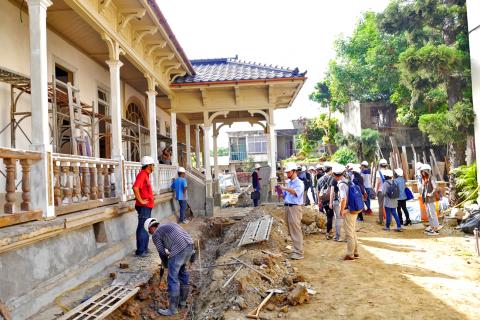There is a building within the grounds of Tainan First High School that used to be the official residence of the mayor of Tainan under Japanese rule. Because the building combines Japanese and Western features, making it quite special, the Tainan Municipal Administration of Cultural Heritage plans to restore the mayor’s residence to its original condition.
The mayor was the highest-ranking administrative official of the Tainan district in the early years of Japanese rule. Four years ago, the Tainan mayor’s dormitory was listed as a municipal relic. The residence was built at a time when Western things were fashionable in Japan, so the residence’s wooden structure is quite elegantly modeled on the Western classical order, while at the same time retaining features of Japanese-style architecture. The residence and dormitory rank along with the Taipei Guest House, a national historic site, among important officials’ residences of the early period of Japanese rule.
Incidentally, in the course of their repair work, the restorers discovered a corner of a Japanese newspaper poking out from some concrete among the broken bricks and tiles in a corridor. However, because the newspaper is stuck in the concrete, which cannot be broken open, there is currently no way of knowing what the newspaper contains, and it is not known which newspaper from those days it actually is.

Photo: Wang Chieh, Liberty Times
照片:自由時報記者王捷
(Liberty Times, translated by Julian Clegg)
台南一中有一棟建築物,日治時期曾是台南廳長官邸,由於建物採用日、西合併,相當特殊,台南文化資產管理處預計將把廳長官邸還原。
廳長是日治初期台南地區最高行政長官,台南廳長的宿舍在四年前被指定為市定古蹟。當時在建造官邸時,正逢日本建築吹洋風盛行的年代,因此官邸以木結構仿作西洋古典柱式,十分精緻,同時也保留和式建築的特色。官邸宿舍與國定古蹟台北賓館均屬日治時代早期重要官員的宅邸。

Photo: Wang Chieh, Liberty Times
照片:自由時報記者王捷
另外,修復人員在整修時,在廊道碎磚瓦混泥土中發現露出日治時期的報紙一角,但由於在報紙卡在混泥土中,也無法破壞。目前無法知道報紙的內容,也不曉得是當時的哪一份報紙。
(自由時報記者王捷)

Noise pollution is a frequently underestimated environmental hazard. While hearing loss is the best-known outcome associated with noise, emerging research is uncovering how noise affects our health in other ways. From impaired memory and sleep disturbances to cardiovascular problems, the impact of noise is profound. For a start, unpleasant or excessively loud sounds can lead to stress and divert attention. Even everyday noises, such as those caused by traffic, lawnmowers, and construction work, can interfere with cognitive functions and elevate stress levels. “Our ears capture sound, but we hear with our brains,” explains Wei Sun, an audiology researcher at

In the digital age, where communication revolves around text messages, “telephone phobia” (also known as “telephobia”) has become increasingly common, especially among young adults. Despite the ubiquity of smartphones, a significant number of individuals experience anxiety when __1__ making or receiving a phone call. Telephobia, in essence, is a fear or reluctance related to speaking on the phone. __2__ other communication methods, phone conversations require spontaneous responses and lack visual feedback such as body language and facial expressions. In such a real-time situation, telephobia sufferers are concerned about their inability to respond or express themselves appropriately, which can lead

A: Apart from singer Daniel Kang, more South Korean stars are coming to Taiwan in March. B: Really? Like who? A: Taeyeon of Girls’ Generation will hold a concert at the Taipei Dome on March 16. B: So she’ll set a milestone by becoming the first K-pop artist to stage a show at the venue. A: Singer Lee Mu-jin, boy group NCT 127 and girl group GFRIEND are also visiting Taiwan. I can’t wait. A: 除了姜丹尼爾,3月有不少韓星訪台。 B: 真的嗎?有誰啊? A: 像是少女時代的太妍,3月16日即將唱進大巨蛋。 B: 成為首位破蛋的韓流歌手,這可真是一項里程碑! A: 歌手李茂珍、男團NCT 127、女團GFRIEND 3月也要來,真是令人期待。 (By Eddy Chang, Taipei Times/台北時報張迪)

A: My favorite K-pop superstar, Daniel Kang, will hold a concert at the Taipei Music Center. B: Wow, I’ve also been a fan since he debuted in 2017 as the “center” of the two-year limited boy group Wanna One. A: Since Daniel went solo in 2019, he has continued to shine internationally. B: When is his show taking place? A: It’s scheduled for March 1, which is my birthday. It’s the best birthday gift ever. A: 我最愛的韓星姜丹尼爾要在台北流行音樂中心開唱啦。 B: 哇,自他在2017年以2 年限定男團Wanna One「C位」出道時,我就 一直是他的粉絲。 A: 而他在2019 年單飛後,還是持續在國際上發光發熱。 B: 演唱會是哪天? A: 日期訂在3月1日,也是我的生日。這真是最好的生日禮物! (By Eddy Chang,